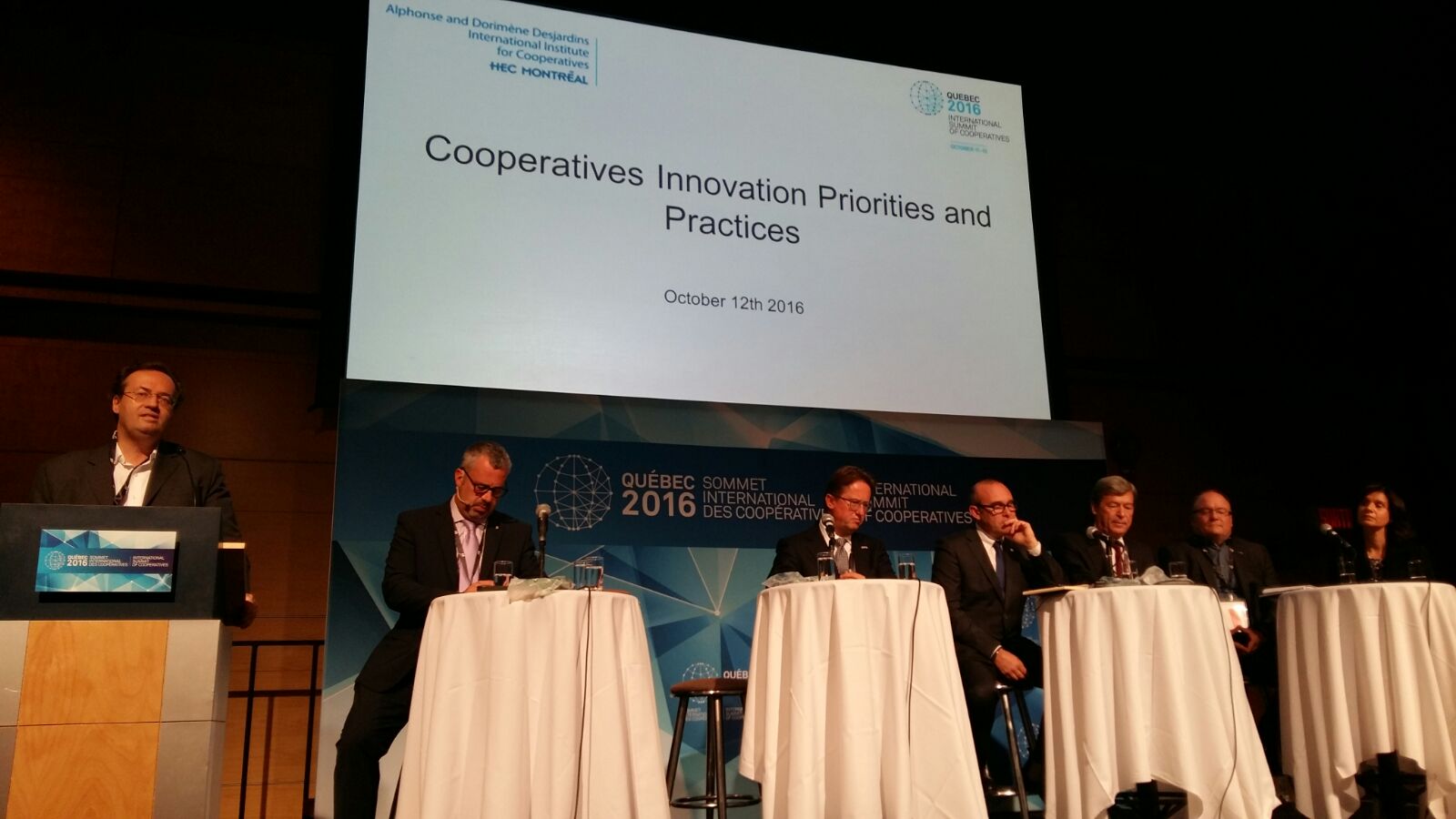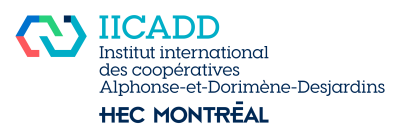



October 13, 2016
The Alphonse and Dorimène Desjardins International Institute for Cooperatives of HEC Montréal participated in and facilitated a number of activities at the International Summit of Cooperatives held in Quebec City from 11th to 13th October 2016.
Organized by the International Co-operative Alliance and the Desjardins Group, the Summit is a biennial business development event for the cooperative and mutual community. The theme of this Summit was “Cooperatives: the Power to Act” to highlight their actions and contributions in respect of the current challenges facing our societies.
More than 200 renowned speakers were present, including Robert Reich (Economist and former United States Secretary of Labor), Joseph E. Stiglitz (Nobel Prize in Economic Sciences and Professor at Columbia University), Jeremy Rifkin (Economist and political advisor), as well as many Presidents and CEOs from the cooperative and mutualist community.
The Efficiency of the Cooperative Banking Model
Sectoral meeting: Banking and Financial Services
On Tuesday, 11th October, Rym Ayadi was invited to the round table discussion on the state of research into the performance of banking business models.
She used the occasion to present the results of the latest study published by the Institute: Banking Business Models Monitor – Europe 2015, and those under way for the United States, Canada and Brazil. These extensive pieces of research aim to identify the different banking business models, analyzing them in various dimensions, such as financial performance, contribution to the real economy and risk.
#Cooperatives perform as well as other types of #banks but have lower #leverage and contribute more to the #economy @rymayadi #ISCOOP16 pic.twitter.com/EuVTLe765b
— Institut Coop (@institut_coop) 12 octobre 2016
Rym Ayadi pointed out that cooperative banks in Europe mainly had a retail focused business model, while others demonstrated a more diversified type of business model. Financial cooperatives performed as well as other types of banks, but accumulated less risk and were more resilient to crisis conditions, she said, adding that they also played a key role in financing the real economy in times of crisis and in fostering financial inclusion.
Developing a Culture of Innovation – A Priority to Provide Capacity for Growth
Forum: Developing a Culture of Innovation
On Wednesday, October 12th , Eric Brat, Associate Professor at the Institute, was one of the panellists at the Forum: Developing a Culture of Innovation, where he presented the results of the study report published by the Institute: Innovation: Priorities and Practices in Cooperatives.
Eric Brat at the Forum: Developing a Culture of #Innovation – A Priority to Provide Capacity for Growth. #ISCOOP16 #SocInnov pic.twitter.com/4BuGQ5SsTW
— Institut Coop (@institut_coop) 12 octobre 2016
He said that cooperatives have specific innovation priorities, such as improving the relationship with members, social innovation and sustainable development. Through this study, the authors had discovered that several cooperatives used “Design Thinking” as a process of innovation, a collective intelligence methodology that emanated from the needs of users to develop solutions. This process could be adapted to the cooperative context in which the relationship to the members is paramount. Finally, member participation can be seen as a real competitive advantage for innovation.
Rendez-vous: Cooperatives Gateway
From 11-13 October, in collaboration with the HEC Montréal Library and BiblioMondo, the Institute presented the Cooperatives Gateway in various languages (French, English and Spanish).
Thanks for your participation at the presentation of the Cooperatives Gateway. #ISCOOP16 #coops pic.twitter.com/VqwPKOJMfb
— Institut Coop (@institut_coop) 11 octobre 2016
It was explained that several international organizations, such as the United Nations, the European Commission and the International Labor Organization (ILO) had stressed the importance and urgency of increasing the knowledge of the cooperative world, so that this business model was not neglected in academic and business fields.
In partnership with the HEC Montréal Library and BiblioMondo, the Institute launched the Cooperatives Gateway. The latter aims to promote access, development and the sharing of knowledge on cooperatives and mutuals in the digital age..
It was revealed that more than 30 licenses for the re-broadcasting of digital documents had already been signed with organizations located in different countries of the world, with the aim of continuing to expand the circle of collaborators and developing an International Network for the Digitization and Access to Knowledge made up of cooperatives, mutuals, libraries, research centers, researchers, publishers, representative bodies of cooperatives and international organizations.
In this context, a pilot experiment had also been launched with the Utopia Library of the Centro Cultural de la Cooperación Floreal Gorini, in collaboration with Banco Credicoop in Argentina, to transfer and distribute several of their collections on the Gateway.
The Cooperatives Gateway is multilingual and responsive, making its compatibility with all devices (computer, tablet and smartphone). Explore the Cooperatives Gateway on portailcoop.hec.ca.
The Cooperative Movement in Latin America
On Tuesday 11th October, the Institute organized a conference in Spanish for Latin America, in which Rym Ayadi, together with Inmaculada Buendía Martínez, Senior Research Associate at the Institute, and Rita Benavente, Administration Coordinator at BiblioMondo, respectively presented the results of the ongoing research into the Banking and Credit Cooperatives Business Models in Brazil; the results that were specific to the Latin American cooperatives in the study report Innovation: Priorities and practices in cooperatives (download the presentation); and finally, the new Cooperatives Gateway.
Presentation of the Cooperative Gateway by @institut_coop at the Latin American Seminar on Cooperatives. #ISCOOP16 #cooperatives pic.twitter.com/vSNLyXLRbO
— Institut Coop (@institut_coop) 11 octobre 2016
